Lining Xing
A Distance Similarity-based Genetic Optimization Algorithm for Satellite Ground Network Planning Considering Feeding Mode
Aug 29, 2024


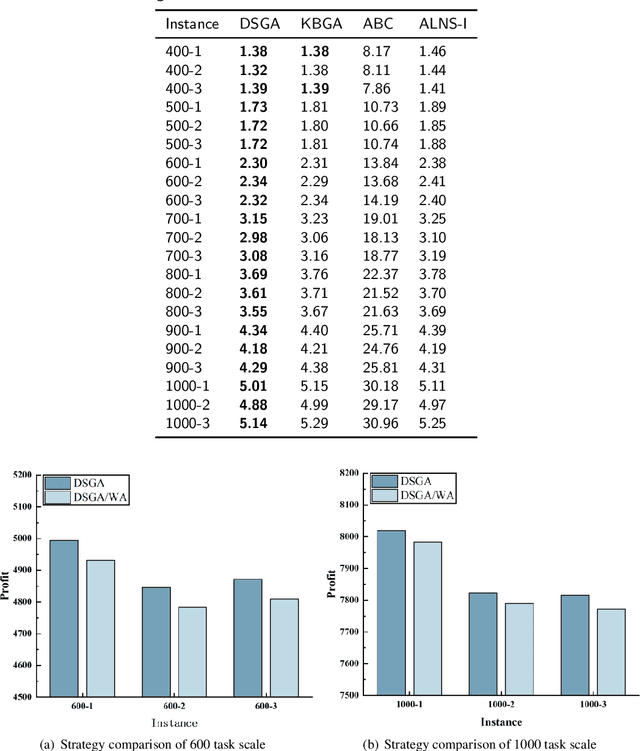
Abstract:With the rapid development of the satellite industry, the information transmission network based on communication satellites has gradually become a major and important part of the future satellite ground integration network. However, the low transmission efficiency of the satellite data relay back mission has become a problem that is currently constraining the construction of the system and needs to be solved urgently. Effectively planning the task of satellite ground networking by reasonably scheduling resources is crucial for the efficient transmission of task data. In this paper, we hope to provide a task execution scheme that maximizes the profit of the networking task for satellite ground network planning considering feeding mode (SGNPFM). To solve the SGNPFM problem, a mixed-integer planning model with the objective of maximizing the gain of the link-building task is constructed, which considers various constraints of the satellite in the feed-switching mode. Based on the problem characteristics, we propose a distance similarity-based genetic optimization algorithm (DSGA), which considers the state characteristics between the tasks and introduces a weighted Euclidean distance method to determine the similarity between the tasks. To obtain more high-quality solutions, different similarity evaluation methods are designed to assist the algorithm in intelligently screening individuals. The DSGA also uses an adaptive crossover strategy based on similarity mechanism, which guides the algorithm to achieve efficient population search. In addition, a task scheduling algorithm considering the feed-switching mode is designed for decoding the algorithm to generate a high-quality scheme. The results of simulation experiments show that the DSGA can effectively solve the SGNPFM problem.
A Knowledge-driven Memetic Algorithm for the Energy-efficient Distributed Homogeneous Flow Shop Scheduling Problem
Apr 28, 2024



Abstract:The reduction of carbon emissions in the manufacturing industry holds significant importance in achieving the national "double carbon" target. Ensuring energy efficiency is a crucial factor to be incorporated into future generation manufacturing systems. In this study, energy consumption is considered in the distributed homogeneous flow shop scheduling problem (DHFSSP). A knowledge-driven memetic algorithm (KDMA) is proposed to address the energy-efficient DHFSSP (EEDHFSSP). KDMA incorporates a collaborative initialization strategy to generate high-quality initial populations. Furthermore, several algorithmic improvements including update strategy, local search strategy, and carbon reduction strategy are employed to improve the search performance of the algorithm. The effectiveness of KDMA in solving EEDHFSSP is verified through extensive simulation experiments. It is evident that KDMA outperforms many state-of-the-art algorithms across various evaluation aspects.
LAGA: A Learning Adaptive Genetic Algorithm for Earth Electromagnetic Satellite Scheduling Problem
Jan 07, 2023Abstract:Earth electromagnetic exploration satellites are widely used in many fields due to their wide detection range and high detection sensitivity. The complex environment and the proliferating number of satellites make management a primary issue. We propose a learning adaptive genetic algorithm (LAGA) for the earth electromagnetic satellite scheduling problem (EESSP). Control parameters are vital for evolutionary algorithms, and their sensitivity to the problem makes tuning parameters usually require a lot of effort. In the LAGA, we use a GRU artificial neural network model to control the parameters of variation operators. The GRU model can utilize online information to achieve adaptive adjustment of the parameters during population search. Moreover, a policy gradient-based reinforcement learning method is designed to update the GRU network parameters. By using an adaptive evolution mechanism in the algorithm, the LAGA can autonomously select crossover operators. Furthermore, a heuristic initialization method, an elite strategy, and a local search method are adopted in the LAGA to enhance the overall performance. The proposed algorithm can obtain a more optimal solution on the EESSP through sufficient experimental validations compared to the state-of-the-art algorithms.
RL-EA: A Reinforcement Learning-Based Evolutionary Algorithm Framework for Electromagnetic Detection Satellite Scheduling Problem
Jun 12, 2022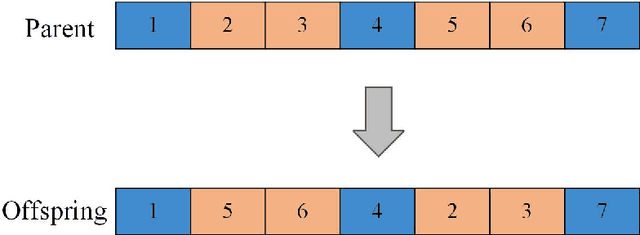

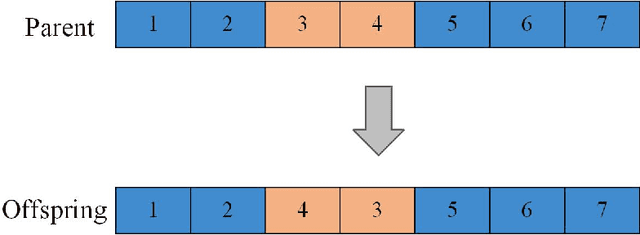

Abstract:The study of electromagnetic detection satellite scheduling problem (EDSSP) has attracted attention due to the detection requirements for a large number of targets. This paper proposes a mixed-integer programming model for the EDSSP problem and an evolutionary algorithm framework based on reinforcement learning (RL-EA). Numerous factors that affect electromagnetic detection are considered in the model, such as detection mode, bandwidth, and other factors. The evolutionary algorithm framework based on reinforcement learning uses the Q-learning framework, and each individual in the population is regarded as an agent. Based on the proposed framework, a Q-learning-based genetic algorithm(QGA) is designed. Q-learning is used to guide the population search process by choosing variation operators. In the algorithm, we design a reward function to update the Q value. According to the problem characteristics, a new combination of <state, action> is proposed. The QGA also uses an elite individual retention strategy to improve search performance. After that, a task time window selection algorithm is proposed To evaluate the performance of population evolution. Various scales experiments are used to examine the planning effect of the proposed algorithm. Through the experimental verification of multiple instances, it can be seen that the QGA can solve the EDSSP problem effectively. Compared with the state-of-the-art algorithms, the QGA algorithm performs better in several aspects.
Agile Earth observation satellite scheduling over 20 years: formulations, methods and future directions
Mar 13, 2020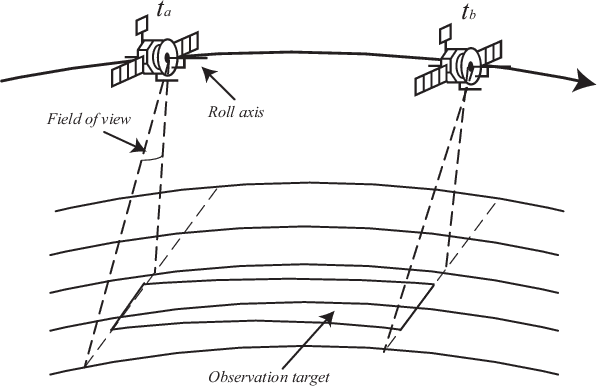

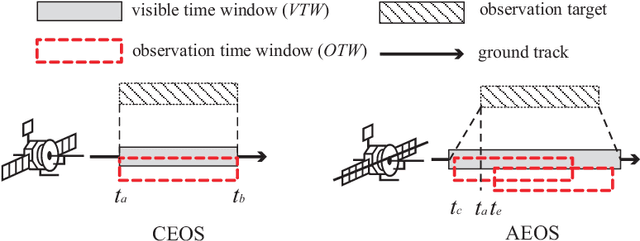
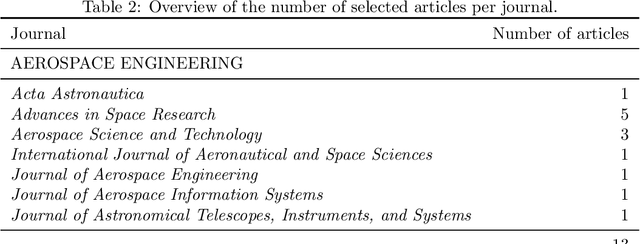
Abstract:Agile satellites with advanced attitude maneuvering capability are the new generation of Earth observation satellites (EOSs). The continuous improvement in satellite technology and decrease in launch cost have boosted the development of agile EOSs (AEOSs). To efficiently employ the increasing orbiting AEOSs, the AEOS scheduling problem (AEOSSP) aiming to maximize the entire observation profit while satisfying all complex operational constraints, has received much attention over the past 20 years. The objectives of this paper are thus to summarize current research on AEOSSP, identify main accomplishments and highlight potential future research directions. To this end, general definitions of AEOSSP with operational constraints are described initially, followed by its three typical variations including different definitions of observation profit, multi-objective function and autonomous model. A detailed literature review from 1997 up to 2019 is then presented in line with four different solution methods, i.e., exact method, heuristic, metaheuristic and machine learning. Finally, we discuss a number of topics worth pursuing in the future.
Order Acceptance and Scheduling with Sequence-dependent Setup Times: a New Memetic Algorithm and Benchmark of the State of the Art
Oct 04, 2019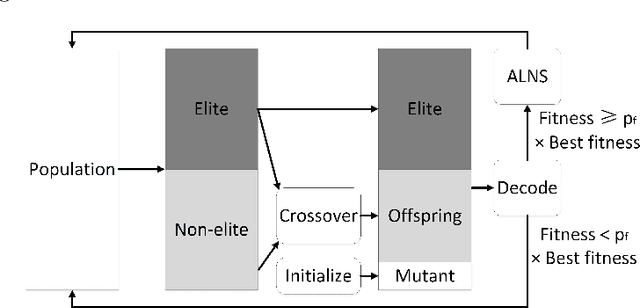

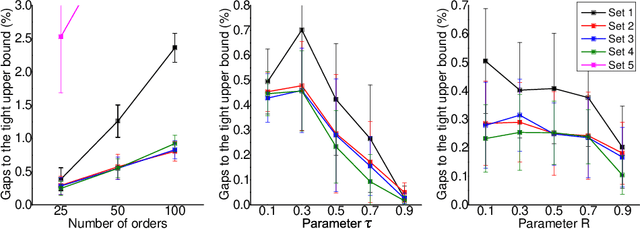
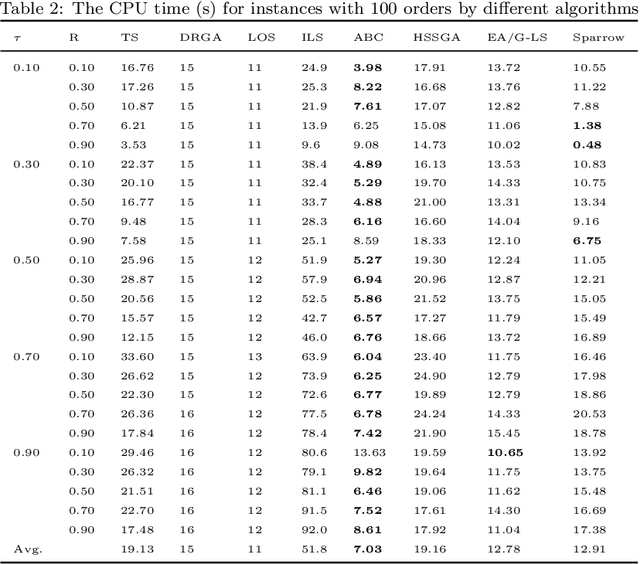
Abstract:The Order Acceptance and Scheduling (OAS) problem describes a class of real-world problems such as in smart manufacturing and satellite scheduling. This problem consists of simultaneously selecting a subset of orders to be processed as well as determining the associated schedule. A common generalization includes sequence-dependent setup times and time windows. A novel memetic algorithm for this problem, called Sparrow, comprises a hybridization of biased random key genetic algorithm (BRKGA) and adaptive large neighbourhood search (ALNS). Sparrow integrates the exploration ability of BRKGA and the exploitation ability of ALNS. On a set of standard benchmark instances, this algorithm obtains better-quality solutions with runtimes comparable to state-of-the-art algorithms. To further understand the strengths and weaknesses of these algorithms, their performance is also compared on a set of new benchmark instances with more realistic properties. We conclude that Sparrow is distinguished by its ability to solve difficult instances from the OAS literature, and that the hybrid steady-state genetic algorithm (HSSGA) performs well on large instances in terms of optimality gap, although taking more time than Sparrow.
 Add to Chrome
Add to Chrome Add to Firefox
Add to Firefox Add to Edge
Add to Edge